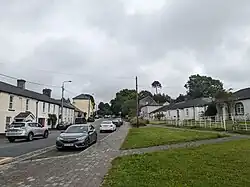Johnstown
Baile Eoin | |
|---|---|
Village | |
 Main Street, Johnstown | |
 Johnstown Location in Ireland | |
| Coordinates: 53°14′06″N 6°37′21″W / 53.23491°N 6.62259°W | |
| Country | Ireland |
| Province | Leinster |
| County | County Kildare |
| Population | 1,320 |
| Time zone | UTC+0 (WET) |
| • Summer (DST) | UTC-1 (IST (WEST)) |
| Irish Grid Reference | N893196 |
Johnstown (Irish: Baile Eoin)[2] is a village in County Kildare, Ireland. It is located 2 km (1.2 mi) north of Naas just off the N7 at junction 8. It is approximately 25 km (16 mi) from Dublin city centre, and is a home for commuters working in Dublin and Naas. Most of the housing was built after 1990.
The village was set out as a planned settlement.[3]
The main street was a part of the old main road southwest from Dublin towards Cork and Limerick, and the village was a hamlet in 1970. The Johnstown Inn was a busy coaching stop until the 19th century, and outside it the Cork mail coach was stopped and burned at the start of the 1798 rebellion. It had a post office that closed in the 1920s.
The village still has the ruins of the medieval St John's church that became a ruin after 1500 under the Tudor seizure of church property. The church was a satellite of St. John's (Hospitaller) Priory in Kilmainham, Dublin. The church is famous for the grave of the Earl of Mayo, the viceroy, who was killed in India in 1872.
The main road eventually bypassed Johnstown in 1964 when the Naas dual carriageway was finished. This was enlarged into the 6-lane N7 road from Dublin to Johnstown, after which it reduces to the 4-lane M7 motorway that runs towards Limerick.
Notes
- ↑ "Census 2022 - F1015 Population". Central Statistics Office Census 2022 Reports. Central Statistics Office Ireland. August 2023. Retrieved 16 September 2023.
- ↑ "Baile Eoin/Johnstown". Logainm.ie (in Irish). Retrieved 25 April 2017.
- ↑ Darley, Gillian (1975). Villages of vision. London: Architectural Press. p. 148. ISBN 0-85139-705-0. OCLC 1921555.
